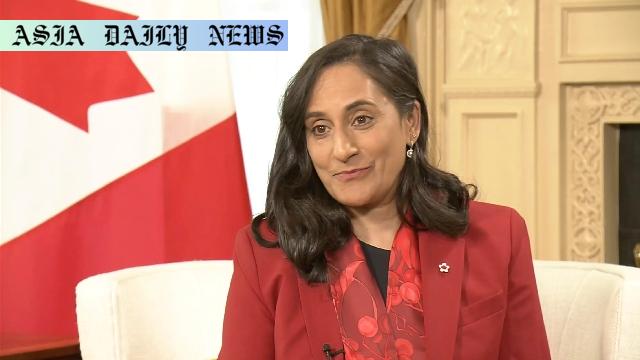Canada G7 Meeting: FM Anita Anand reveals plans for a G7 foreign ministers’ gathering in Canada to address Ukraine and sovereignty.

Canada’s G7 Leadership: A Focus on Ukraine
As the current chair of the Group of Seven (G7), Canada has taken a prominent stance in addressing global geopolitical issues. Foreign Minister Anita Anand, during her interview in Tokyo, affirmed Canada’s commitment to hosting another G7 foreign ministerial meeting, focusing heavily on the ongoing crisis in Ukraine. This meeting, slated to take place later this year, will be pivotal in fostering dialogue on key principles such as territorial integrity and the sovereignty of nations. Anand stressed the importance of allowing Ukraine to determine its future without external pressure or influence, reiterating her belief in the global community’s responsibility to defend these principles.
The G7, a collective of seven of the world’s largest advanced economies, serves as a platform for international collaboration on pressing issues. Canada’s leadership this year presents a significant opportunity to address not only the Ukraine-Russia conflict but also broader concerns regarding geopolitical stability and the upholding of international law. The discussions planned by Minister Anand aim to build upon the momentum from previous meetings, including the recent Hague gathering coinciding with the NATO summit. These efforts signal Canada’s determination to remain a key player in global diplomacy.
Challenges in Navigating International Relations
While championing the cause of Ukraine, Canada’s foreign minister also drew attention to challenges emanating from bilateral relations with its neighbor, the United States. Minister Anand criticized US President Donald Trump’s tariff policies, which have adversely affected critical Canadian industries such as steel, aluminum, and automotive manufacturing. These industries, vital to Canada’s economy, have borne the brunt of these tariff measures, reflecting the intricate balance Canada must strike in its dealings with the United States. Anand underscored the adverse effects on Canadian businesses, workers, and families, describing the impact as “visceral.”
Furthermore, Canada’s insistence on its sovereignty was unequivocally stated when Anand pushed back against Trump’s suggestion that Canada consider becoming the 51st state of the US. Her firm response, “Canada will never be the 51st state. Period,” showcased the country’s resolve to uphold its independence and unique identity in the international arena, even as bilateral negotiations over tariffs continue toward a July 21 deadline.
Future Implications: Canada’s Role in G7 Diplomacy
Canada’s proactive stance offers both opportunities and challenges as it seeks to address global crises through the G7 platform. With its leadership under scrutiny, Canada’s efforts to foreground issues such as Ukraine’s sovereignty could bolster its position as a key advocate for territorial integrity and democratic principles. However, navigating sensitive relationships—be it with Russia, the United States, or even fellow G7 members—will require adept diplomacy and foresight.
The initial lack of a joint statement on Ukraine during the June G7 summit highlights the complexities involved in achieving consensus among the member nations. This upcoming ministerial meeting, therefore, represents an opportunity for Canada to craft a unified narrative that addresses the geopolitical realities of the Ukraine crisis, while bolstering multilateral cooperation. In this context, Canada not only reinforces its role as a mediator but also as a leading voice during a critical moment in history.
Ultimately, Canada’s decision to focus significantly on Ukraine and the broader implications for international law and order indicate a long-term commitment to fostering global stability. With the upcoming meeting, Canada’s leadership could serve as a model for constructive collaboration within the G7 framework, strengthening its influence on the international stage.
Commentary
Canada’s Leadership in a Complex Geopolitical Landscape
Canada’s decision to host another G7 foreign ministerial meeting is both timely and significant. Minister Anand’s focus on Ukraine underscores the pressing need for global powers to unite in addressing the ongoing territorial challenges. By emphasizing principles such as sovereignty and territorial integrity, Canada is championing ideals fundamental to international law and order. In doing so, Canada reinforces its commitment to multilateralism at a time when such unity is increasingly under strain. However, taking on a leadership role in an issue as polarized as the Ukraine conflict requires diplomatic finesse, especially with varying perspectives among G7 members.
Evolving Dynamics in Canada-US Relations
Minister Anand’s outspoken criticism of US tariffs is a clear indication of the challenges Canada faces in balancing its economic dependence on the United States with its right to contest unfair practices. The assertion that Canadian industries are being hit hard by these measures highlights the real-world implications of trade policies on everyday lives. Moreover, Anand’s response to Trump’s suggestion of Canada becoming a US state reflects the nation’s steadfast commitment to maintaining its sovereignty. This defiance not only asserts Canada’s independence but also symbolizes its resilience as a nation and partner in global platforms like the G7.
A High-Stakes Opportunity for Multilateral Cooperation
The success of Canada’s upcoming G7 meeting will depend on its ability to foster consensus among member states while addressing diverse global challenges. By placing Ukraine at the center of the discussion, Canada demonstrates a willingness to act as a mediator in a conflict that has far-reaching consequences. However, achieving definitive outcomes on this and other issues will require strategic negotiation and an unwavering commitment to principles. If successful, Canada’s leadership could set a precedent for how the G7 addresses complex geopolitical crises in the future.
Ultimately, Canada’s proactive approach underlines its potential to shape international discourse in meaningful ways, navigating challenges and opportunities in an evolving global landscape.


